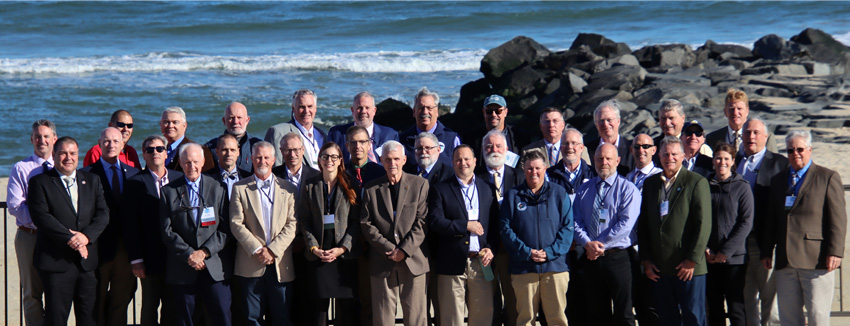About Us
Our Beginning
In the early 1940s, recognizing that they could accomplish far more through cooperation rather than individual effort, the Atlantic coast states came together to form the Atlantic States Marine Fisheries Commission (Commission). An Interstate Compact, ratified by the states and approved by the U.S. Congress in 1942, acknowledged the necessity of the states joining forces to manage their shared migratory fishery resources and affirmed the states’ commitment to cooperative stewardship in promoting and protecting Atlantic coastal fishery resources.
Who We Are
For over 80 years, the Commission has served as a deliberative body of the Atlantic coastal states, coordinating the conservation and management of 27 nearshore fish species. Each state is represented on the Commission by three Commissioners: the director of the state’s marine fisheries management agency, a state legislator, and an individual appointed by the state’s governor to represent stakeholder interests. These Commissioners participate in deliberations in the Commission’s main policy arenas: interstate fisheries management, fisheries science, habitat conservation, and law enforcement. Through these activities, the states collectively ensure the sound conservation and management of their shared coastal fishery resources and the resulting benefits to the fishing and non-fishing public. To learn more about the Commission's history, visit Forging Knowledge Into Change: Commemorating 75 Years of Cooperative Sustainable Fisheries Management.
Management Success Through State/Federal Partnership
The states have found that their mutual interest in sustaining healthy coastal fishery resources is best promoted by working in collaboration with their federal partners – NOAA Fisheries and the U.S. Fish and Wildlife Service. Our Commissioners appreciate the strong support of members of Congress and the governors and legislators of our member states. The Commission’s many accomplishments over the years would not have been possible without the trust and confidence of our federal partners. With this approach, the states uphold their collective fisheries management responsibilities in a cost-effective, timely, and responsive fashion.
Two important pieces of legislation – the Atlantic Striped Bass Conservation Act (1984) and Atlantic Coastal Fisheries Cooperative Management Act (ACFCMA, 1993) – truly exemplify the successes that can be achieved when state and federal agencies and Congress join forces to rebuild coastal fisheries. Both Acts recognize the interjurisdictional nature of fishery resources and the necessity of the states and federal government to implement regulations that ensure their conservation and sustainability. As a result of the Acts, all Atlantic coast states that are included in a Commission fishery management plan must implement required conservation provisions of the plan or the Secretary of Commerce (and the Interior in the case of striped bass) may impose a moratorium for fishing in the noncompliant state’s waters. The recovery of Atlantic striped bass, black sea bass, bluefish scup, summer flounder, Spanish mackerel, and spiny dogfish stocks are all a result of these requirements and resultant tough management actions of the states and federal government.
Jobs and the Economy
The Commission is committed to ensuring the sustainability of Atlantic coast fishery resources. Healthy and vibrant resources mean more jobs and more opportunity for those that live along the coast. In 2016, marine commercial and recreational fisheries generated approximately 1.7 million jobs in the U.S. economy. In addition, commercial and recreational fishing combined generated $212.2 billion in sales impacts, $64.2 billion in income impacts, and $99.5 billion in value-added impacts throughout the economy. Further, more than 90 percent of the Atlantic coast recreational catch is taken in state waters, with many of the most prominent species, such as Atlantic striped bass, summer flounder and red drum, moving through multiple jurisdictions.
In the face of increasing fisheries management demands and unprecedented state budget cuts, the Commission is extremely efficient and produces a high return on investment – even with a budget that has remained essentially level for the past decade. With millions of people depending on Atlantic coast fisheries for recreation, work, and as a source of nourishment, this investment by Congress and the states likely represents one of the best return rates in all natural resource management.
How We Are Funded
The Commission is funded through a combination of member state dues and state and federal grants. Annual state dues are based on the value of each state’s commercial fishing landings and number of saltwater recreational trips. The majority of the Commission’s federal funding is received through NOAA Fisheries, to implement ACFCMA, and carry out the mandates of the Interjurisdictional Fisheries Act of 1986 (P.L. 99-659).
One State/One Vote
Partnerships are the key to the continued success of the Commission. The one state/one vote concept drives decision making and ensures fairness as we work closely with our federal partners to maintain important state fishery management and monitoring programs. The Commission is an effective, transparent, inclusive, and efficient process for managing Atlantic coastal migratory resources. Commissioners are committed to finding long-term, durable solutions that are best for all rather than best for a single state or region. The Commission remains committed to accountability as we continue to assess stock health, identify threats, implement effective rebuilding programs, and manage the stocks under our care.
The Task Ahead
While the Commission faces a number of significant challenges including uncertain fiscal resources, competing ocean uses, restoring overfished stocks, and habitat threats, it remains committed to the successful management of marine resources along the Atlantic coast.
Our Commissioners are dedicated to leaving healthy and abundant marine fisheries for the next generation to enjoy. It is that dedication, along with the strong support of our federal partners, that will enable us to work cooperatively at the state, interstate, and federal levels to reinforce that investment in marine fisheries management and science will return great economic and social benefits to the nation.
